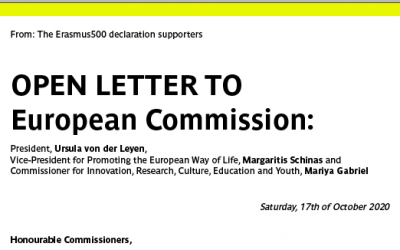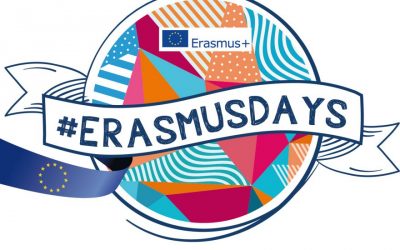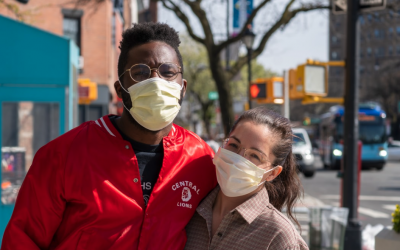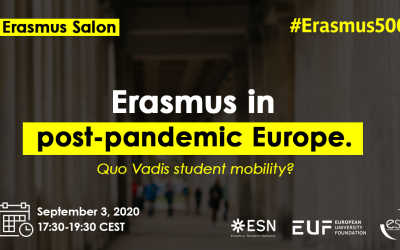We have been together for a few months now, fighting side by side for the ideas embodied in the #Erasmus500 declaration. Today we would like to thank you for your support, and take stock of how far we have come.
Towards a truly
European Erasmus grant
#Erasmus500
News
Open Letter to the European Commission
#Erasmus500 Open Letter to the European Commission I We come to you today with a simple request: we ask you to be champions for an Erasmus+ programme that allows for the participation of many more students from all walks of life!
More ambitious and sustainable grant systems will lead the way to a more integrated Europe.
Gianluca Rossino, Policy Officer for European Citizenship at AEGEE, tells us about the importance of equal opportunities for all young people across Europe.
Erasmus Days 2020: halfway between celebration and reflection
This year and amidst the madness of Covid-19, the 3-day celebration, is kicking off tomorrow to offer many opportunities, both online and on-site, to all European citizens who love and cherish Erasmus+.
Erasmus and national students switch into online-mode during COVID-19
The podcast, produced by the German research group Next.Education, stemming from an initiative of Prof. Ulf-Daniel Ehlers, talks to national and international students from all over Europe about studying, challenges and benefits of European higher education institutions during COVID-19 times.
International students post-pandemic – Can Europe support them?
We already know that youth from disadvantaged backgrounds are less likely to go on exchange. Considering the current times, now it’s even more probable for them to be reluctant to apply. Through #Erasmus500, we ask for a more inclusive Erasmus+ programme.
Watch the high-level debate on the future of Erasmus+ post-pandemic
Last Thursday, September 3rd 2020, Members of the European Parliament and high-level speakers from Higher Education talked about the future of Erasmus+, one of the flagship programmes of the European Union.
Erasmus Salon: Erasmus in post-pandemic Europe
During this virtual Erasmus Salon, Members of the European Parliament will express their opinions on the ongoing MFF negotiations and Erasmus+. We will look at the inclusiveness of the current and future Erasmus programme
What would #Erasmus500 change for IROs?
International relations officers are on the front line of the management of Erasmus+ mobilities. Every year, every semester and every day, outgoing and incoming students rely on the IRO’s office and its personnel to understand the Erasmus+ mechanisms, find housing, know how the institution works and even have someone to share their personal misadventures with.
#Erasmus500 Policy Insights: Elena Smirnova
The Association Européenne des Conservatoires, Académies de Musique et Musikhochschulen (AEC) is the cultural and educational network of 300 member institutions in the field of higher music education. The AEC aims at promoting international cooperation, implementing a range of educational and cultural projects for defending the interests of music students and professors at the European level. Elena Smirnova, new office member of the AEC, tells us about the importance of #Erasmus500, as well as sheds some light on the current issues music students are facing during their exchange programmes.






